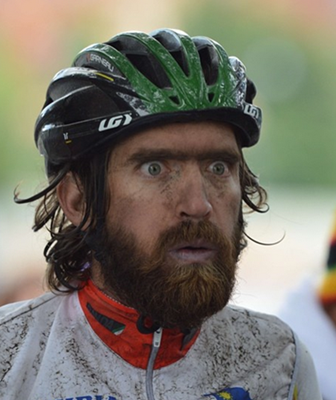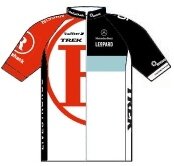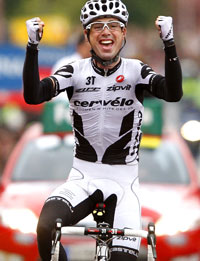
Rider Transfers,Vuelta a Espana
Imagine you’re the manager of a cycling team and you’re looking for a particular type of rider. But instead of finding one guy that fits the job description, you find several, all with very similar physical attributes and identical salary demands – how do you decide which one to sign? The answer might be, whichever one you’re able to remember the most.
Listening to Daniel Friebe’s recent interview with Dan Craven on The Cycling Podcast would certainly lend credence to this assertion. Craven, who has just completed the Vuelta a Espana, his first ever Grand Tour, is one of the most remember-able riders in the peloton due to the considerable facial hair that he’s been cultivating for the last few years. In a sport where beards and moustaches are not all that common, Craven stands out immediately, a fact not lost on the Namibian rider when he spoke to Friebe about how he ended up signing for Team Europcar:
What have been some of the highlights or is there anything that has surprised you while doing your first Grand Tour?I think the reaction to me…
It’s just the beard though isn’t it?
Well, mainly. If it wasn’t for the beard, people wouldn’t have noticed me, put it that way, definitely. If it wasn’t for the beard Jean René [Bernaudeau, DS of Team Europcar] probably wouldn’t have noticed me. Well, no, I did try and give his riders a hiding in 2011, so he would have noticed me, but he really noticed me because I had a big beard.
Now, obviously it’s got a lot of admirers, it’s got its own Twitter account I think.
Insane.
What is the future of the beard?
Basically, I think I look like an idiot without a beard.
How long have you had it? You’ve had it for quite some years, perhaps not as long as it is now…
The first time I raced with a beard was 2010 in the Rás in Ireland, the good old Rás! But ever since I was at university, I think 2001 or 2002, I started playing with facial hair, doing a goatee or sideburns. But it’s only since 2010 that I’ve actually had a beard….
So the beard’s gonna stay?
There’s no doubt about that. It’s staying. Even if it’s just because I think I look stupid without it. And I mean, after getting all of the attention that I got at this race, at the end of the day, my job is to be a billboard. And I would be kind of stupid to cut it off. If I cut my beard off I’d cut my publicity by 95% which would be very stupid. So it’ll be trimmed, but the beard is staying.
The questions put to Craven about the beard seemed to be partially in jest, and they were taken as such by Craven. But he seemed completely sincere when he spoke with clarity about the idea of getting rid of it potentially affecting his livelihood. It had got him where he is today, at the pinnacle of the sport of cycling at the unusually advanced age of 31.*****

‘Tis a fine beard
The idea that an athlete will be offered a contract based solely on some seemingly trivial physical feature is something which is covered in Soccernomics, a book written by Simon Kuper and Stefan Szymanski which takes an economic, statistical and psychological view of soccer. In a section on market inefficiencies, the authors write the following:
“At least one big English club noticed that its scouts kept recommending blonde players. The likely reason: when you are scanning a field of twenty-two similar-looking players, the blondes tend to stand out (except, presumably, in Scandinavia). The colour catches the eye. So the scout notices the blonde player without understanding why. The club in question began to take this distortion into account when judging scouting reports.
Similarly, [Billy] Beane at the Oakland A’s noticed that baseball scouts had all sorts of ‘sight-based prejudices’. They were suspicious of fat guys or skinny little guys or ‘short right-handed pitchers’ and they overvalued handsome, strapping athletes of the type that Beane himself had been at age seventeen. Scouts look for players who look the part. Perhaps in soccer, blondes are thought to look more like superstars.
This taste for blondes is an example of the ‘availability heuristic’: the more available a piece of information is to the memory, the more likely it is to influence your decision, even when the information is irrelevant. Blondes stick in the memory.”
Kuper and Szymanski don’t quite use the term ‘availability heuristic’ correctly here. This was an idea which was first proposed by psychologists Amos Tversky and Daniel Kahneman in 1973 in a paper entitled ‘Availability: A heuristic for judging frequency and probability’ where they conclude:
“Continued preoccupation with an outcome may increase its availability, and hence its perceived likelihood. People are preoccupied with highly desirable outcomes, such as winning the sweepstakes, or with highly undesirable outcomes, such as an airplane crash. Consequently, availability provides a mechanism by which occurrences of extreme utility (or disutility) may appear more likely than they actually are”
Therefore, the availability heuristic in this blonde player context would be more akin to a scout who was totally enamored with Stefan Effenberg and so the blonde player he’s looking at now, he perceives as having a high probability of also being a good player.
And in the context of the bearded cyclist, using the ‘availability heuristic’ would have been more in line with Jean-René Bernaudeau very much liking Luca Paolini as a rider. So fellow-bearded man Dan Craven, concludes Bernaudeau subconsciously, must be good.
But regardless of the use of the term ‘availability heuristic’, the point Kuper and Szymanski remains applicable to the case of Craven. On the face of it (so to speak), it seems Bernaudeau did end up offering Craven a contract based largely on the fact that he has a big beard. He’s also an excellent cyclist of course. But so are many other cyclists that Bernaudeau could have signed. Craven is an excellent cyclist with a big beard.
Would Friebe have bothered to take the time to seek out Craven for an interview at the Vuelta if he was, like the rest of the peloton, clean shaven?
“There are three things about Craven that have piqued a lot of journalists’ interest” said Friebe when quizzed on the matter. “The beard, his nationality (and ethnicity – the only Namibian most people know is Frankie Fredericks, who’s black) and the fact that he’s moved up to the elite level so late in his career. When you speak to him, you realise he’s interesting for all sorts of other reasons, but I think these three are mainly what made him stand out to me and others at the Vuelta.”
Craven’s nationality is definitely a big draw, he is the first Namibian to have taken part in a Grand Tour. Perhaps there’s also a knock on affect from the Tour de France success of Chris Froome – another white African. However, the third interesting aspect that Friebe mentions, as is being argued here, could be construed as a direct consequence of the first interesting aspect, the beard.
Craven’s venture into the WorldTour, largely off the back of a memorable but ultimately, when it comes to cycling, useless physical feature, is perhaps the first venture of its kind. Given that it has already been rather successful, it may not be the last time we see a rider with an unusual and distinctive peculiarity wriggle their way into the top tier of the sport.
Pro Tour,Rider Transfers,Vuelta a Espana
Leopard-Trek are due to merge with RadioShack to form yet another ‘superteam’ in the world of pro cycling. While it’s exciting times for all the major players in the merger such as Johan Bruyneel and the Schleck brothers, many riders are being left in the lurch.
Consider RadioShack rider Fumiyuki Beppu’s coy tweet on the day that the merger was announced:
They Don’t Care About Us”..Music By Michael Jackson
Beppu was not one of the riders announced in the press release who will be making the move from RadioShack to the new hybrid team.
Another rider left to sort out his future is Philip Deignan, who had this to say in an interview with cyclingnews.com, who I hope will forgive me for the extensive quote:
We’re all pretty shocked about it… It wasn’t something that we were expecting. We know that it was strange that there were no signings in August… So we were expecting changes but I don’t think anyone was expecting the team to stop. We’re shocked and disappointed that the management have left it this late to tell everyone about it.
We haven’t heard from them and we’ve not had any explanation. We’re all pretty disappointed. We had no explanation but the obvious reason seems down to money. But the riders are in the dark the whole time, we’re the last ones to know about these things.
I’ve had a really bad season. I had an injury and viral infection all season…We’re all just trying to cope as best we can. We’re all trying to stay focused but it’s difficult. A lot of the staff here have families and mortgages and there’s over 50 people involved.
What is the most depressing thing about these quotes from Deignan is that these comments weren’t made in the wake of the Leopard-Trek/RadioShack merger. These comments were made almost exactly a year ago when it was announced that Deignan’s Cervelo Test Team would cease to be and would eventually ‘merge’ with Garmin-Transitions to form the ‘superteam’ Garmin-Cervelo. Deignan was not made a part of that merger and was left to find a team for himself and ended up at RadioShack for the year.

Same shit, different day.
Yes, this is the second year in a row that Deignan has had to deal with the same shit. But this year could be far worse for the man from Donegal.
Teams need riders with UCI points in order to ensure that the accumulation of their rider’s points places the team in the top 17 in the world on the points scale. This is to ensure that the team qualifies for a ProTeam license. Riders keep their points with them for the results of the previous two years, so it’s not just this year’s results that are taken into account when determining next year’s Pro Teams, the results from the previous year are also still attributed to the riders in the form of these precious UCI points.
This time last year, Deignan could still rely on his results from the 2009 Vuelta (a stage win and ninth overall) in order to sell himself as an attractive rider (with plenty of UCI points) to potential suitors.
But another year has passed, and now Deignan is forced to deal with the same situation but without the comfort of those UCI points.

Deignan winning a stage in the 2009 Vuelta
His comments in the cyclingnews article that he “had a really bad season. I had an injury and viral infection all season” also pretty much apply to this year. The past two years have been torrid for Deignan with no real results of note. He currently has no UCI points.
So although Deignan has proven he can perform in a Grand Tour, perform domestique duties and is an excellent rider to have in a team, the way the UCI system works means that on paper, Deignan is now essentially worthless.
The Leopard-Trek and RadioShack press releases announcing this upcoming merger contain phrases such as:
a further milestone in the development of this exciting young project
the bright future of our athletes
a great milestone for our team and our global sport
our sponsors’ continuing commitment
will dominate cycling for years to come
I’m sure all the riders and staff that have been left without jobs find this spoon-fed PR shite as nauseating as the rest of us.
This is not a merger. It is a cull. And the fact that it is being dressed up as a triumph for cycling is insulting to cycling fans. But most of all, it is insulting to all the riders who will now struggle to earn a living next year in the sport that they love because of the gross mismanagement of that sport.
In the wake of Bradley Wiggins’ and Ben Swift’s moves to Team Sky recently, the subject of rider’s contracts has come to the fore. Should the British pair have been allowed to leave their former teams to link up with the new Dave Brailsford-led ‘super team’? My personal opinion is no, they shouldn’t have been allowed to move. Wiggins secured the move he craved by threatening a barrage of legal action against Jonathan Vaughters at Garmin. Vaughters succumbed to this threat, not wanting to face a protracted legal battle against the might of a host of Rupert Murdoch’s lawyers. Swift eventually made his move to Team Sky after taking it upon himself to go on an unofficial strike at Katusha.
I really don’t think this type of behaviour should be allowed or encouraged. Riders sign contracts for one,two or sometimes three years and they should honour those contracts. If the antics of this British duo become common-place I fear for the future of the sport. Cycling is not the same as football where players constantly transfer from team to team before their contracts run out. Football teams are established clubs with large structures for youth development and training, a lot of which have been around for more than a hundred years. If players move on, the club will remain and new players will emerge.
A cycling team is much more fragile and is only in existence for a relatively short period of time. A team manager has to be able to approach a sponsor and say “OK, I’ve got Riders A,B,C who I feel may be able to win x amount of races between them next year, which will result in y amount of exposure for your brand which could result in z amount of potential revenue for your company”. A team manager can’t approach a sponsor and say that sentence followed by: “But if any of those riders feel like leaving over the winter there’s not a thing I can do about it”. Who’d sponsor a cycling team if that was the case? Where’s the incentive for potential sponsors? There isn’t any. It’s difficult enough to entice sponsors in to the sport of cycling as it is. Team managers having no control over their rider rosters for the following year would make it impossible.
Transitions are a company new to the sport of cycling and have teamed up with Garmin to co-sponsor Wiggins’ former team for next year. I hope for Transitions’ sake that they weren’t tempted to sponsor the team under the pretense that Wiggins would be part of a setup with the aim of challenging for a Tour de France podium spot this July.
The worst case scenario would have been for Transitions to commit to sponsoring the team and Vaughters to budget for the coming season based on the promised sponsorship revenue. Then for Wiggins to jump ship and Transitions to follow suit, because they were promised sponsorship of a team with a genuine Tour contender. Finally for the whole team to fold because Vaughters could no longer fulfill his salary payment obligations for the year due to the lost revenue from Transitions.
Rider transfers need to be thoroughly regulated by the UCI otherwise attracting new sponsors to the sport will become impossible and the above scenario will become a reality.